学习k12精品英语高三一轮复习系列外研学案导学版文档:第二部分 基础保分篇 第一讲
- 格式:doc
- 大小:114.50 KB
- 文档页数:11
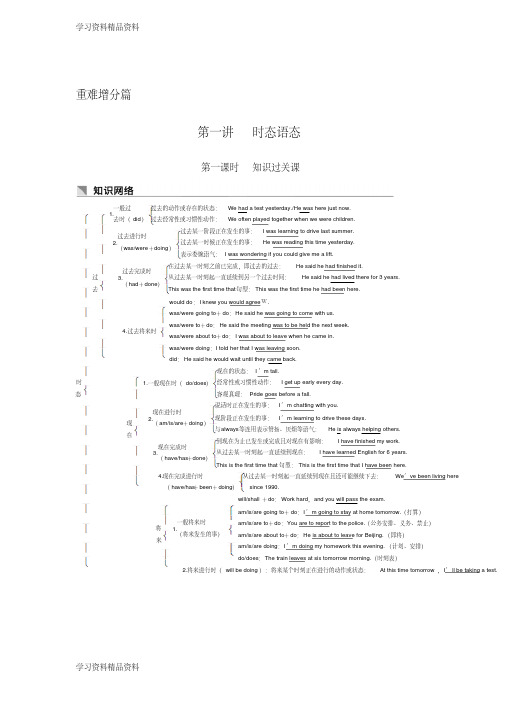
学习资料精品资料学习资料精品资料重难增分篇第一讲时态语态第一课时知识过关课时态过去 1.一般过去时(did )过去的动作或存在的状态:We had a test yesterday./He was here just now.过去经常性或习惯性动作:We often played together when we were children.2.过去进行时(was/were +doing )过去某一阶段正在发生的事:I was learning to drive last summer.过去某一时候正在发生的事:He was reading this time yesterday.表示委婉语气:I was wondering if you could give me a lift.3.过去完成时(had +done )在过去某一时刻之前已完成,即过去的过去:He said he had finished it.从过去某一时刻起一直延续到另一个过去时间:He said he had lived there for 3 years.This was the first time that 句型:This was the first time he had been here.4.过去将来时would do :I knew you would agree W.was/were going to +do :He said he was going to come with us.was/were to +do :He said the meeting was to be held the next week.was/were about to +do :I was about to leave when he came in.was/were doing :I told her that I was leaving soon.did :He said he would wait until they came back.现在1.一般现在时(do/does )现在的状态:I ’m tall.经常性或习惯性动作:I get up early every day.客观真理:Pride goes before a fall.2.现在进行时(am/is/are +doing )说话时正在发生的事:I ’m chatting with you.现阶段正在发生的事:I ’m learning to drive these days.与always 等连用表示赞扬、厌烦等语气:He is always helping others.3.现在完成时(have/has +done )到现在为止已发生或完成且对现在有影响:I have finished my work.从过去某一时刻起一直延续到现在:I have learned English for 6 years.This is the first time that 句型:This is the first time that I have been here.4.现在完成进行时(have/has +been +doing )从过去某一时刻起一直延续到现在且还可能继续下去:We ’ve been living here since 1990.将来 1.一般将来时(将来发生的事)will/shall +do :Work hard ,and you will pass the exam.am/is/are going to +do :I ’m going to stay at home tomorrow.(打算)am/is/are to +do :You are to report to the police.(公务安排、义务、禁止)am/is/are about to +do :He is about to leave for Beijing.(即将)am/is/are doing :I ’m doing my homework this evening.(计划、安排)do/does :The train leaves at six tomorrow morning.(时刻表)2.将来进行时(will be doing ):将来某个时刻正在进行的动作或状态:At this time tomorrow ,I ’ll be taking a test.。
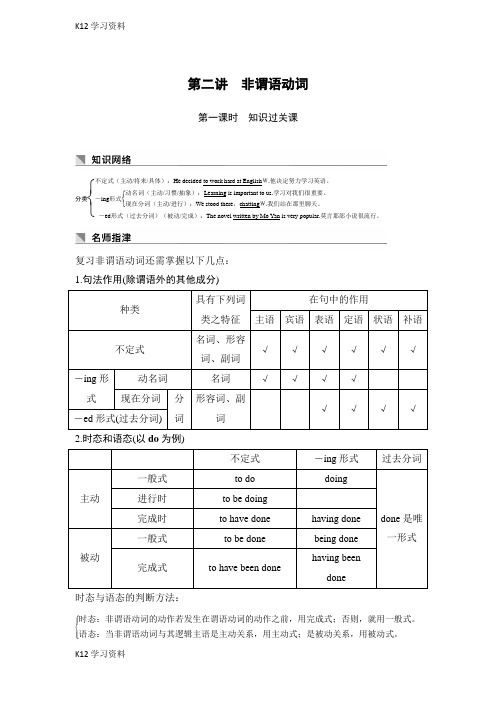
第二讲 非谓语动词第一课时 知识过关课分类⎩⎨⎧不定式(主动/将来/具体):He decided to work hard at English W.他决定努力学习英语。
-ing 形式⎩⎨⎧动名词(主动/习惯/抽象):Learning is important to us.学习对我们很重要。
现在分词(主动/进行):We stood there ,chatting W.我们站在那里聊天。
-ed 形式(过去分词)(被动/完成):The novel written by Mo Yan is very popular.莫言那部小说很流行。
复习非谓语动词还需掌握以下几点:1.句法作用(除谓语外的其他成分)2.时态和语态(以do 为例)时态与语态的判断方法:⎩⎪⎨⎪⎧时态:非谓语动词的动作若发生在谓语动词的动作之前,用完成式;否则,就用一般式。
语态:当非谓语动词与其逻辑主语是主动关系,用主动式;是被动关系,用被动式。
3.非谓语动词的逻辑主语4.有特殊要求的动词或动词短语(1)有的动词后只能用不定式而不能接动名词作宾语。
如ask,demand(要求),plan,intend,mean(计划),manage,do/try one’s best,make an attempt,learn(学习),wish,hope,desire,expect,long,want,would like,should like,would prefer(希望、愿意),agree,promise(同意),decide,determine,choose,make a decision,make up one’s mind(决定),offer(主动提出),apply(申请),help(帮助),fail(不能、没有),prepare(准备),pretend(假装),refuse(拒绝),happen(碰巧),afford(负担得起)等。
(2)有的动词或动词短语后只能用动名词而不能接不定式。
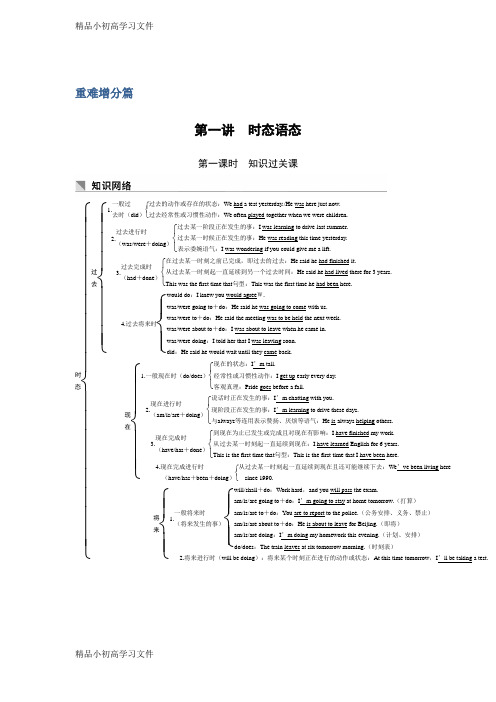
重难增分篇第一讲 时态语态第一课时 知识过关课时态⎩⎪⎪⎪⎪⎪⎪⎪⎪⎨⎪⎪⎪⎪⎪⎪⎪⎪⎧过去⎩⎪⎪⎪⎨⎪⎪⎪⎧1.一般过去时(did )⎩⎨⎧过去的动作或存在的状态:We had a test yesterday./He was here just now.过去经常性或习惯性动作:We often played together when we were children.2.过去进行时(was/were +doing )⎩⎨⎧过去某一阶段正在发生的事:I was learning to drive last summer.过去某一时候正在发生的事:He was reading this time yesterday.表示委婉语气:I was wondering if you could give me a lift.3.过去完成时(had +done )⎩⎨⎧在过去某一时刻之前已完成,即过去的过去:He said he had finished it.从过去某一时刻起一直延续到另一个过去时间:He said he had lived there for 3 years.This was the first time that 句型:This was the first time he had been here.4.过去将来时⎩⎪⎨⎪⎧would do :I knew you would agree W.was/were going to +do :He said he was going to come with us.was/were to +do :He said the meeting was to be held the next week.was/were about to +do :I was about to leave when he came in.was/were doing :I told her that I was leaving soon.did :He said he would wait until they came back.现在⎩⎪⎪⎨⎪⎪⎧1.一般现在时(do/does )⎩⎨⎧现在的状态:I ’m tall.经常性或习惯性动作:I get up early every day.客观真理:Pride goes before a fall.2.现在进行时(am/is/are +doing )⎩⎨⎧说话时正在发生的事:I ’m chatting with you.现阶段正在发生的事:I ’m learning to drive these days.与always 等连用表示赞扬、厌烦等语气:He is always helping others.3.现在完成时(have/has +done )⎩⎨⎧到现在为止已发生或完成且对现在有影响:I have finished my work.从过去某一时刻起一直延续到现在:I have learned English for 6 years.This is the first time that 句型:This is the first time that I have been here.4.现在完成进行时 (have/has +been +doing )⎩⎨⎧从过去某一时刻起一直延续到现在且还可能继续下去:We ’ve been living here since 1990.将来⎩⎪⎨⎪⎧1.一般将来时(将来发生的事)⎩⎪⎨⎪⎧will/shall +do :Work hard ,and you will pass the exam.am/is/are going to +do :I ’m going to stay at home tomorrow.(打算)am/is/are to +do :You are to report to the police.(公务安排、义务、禁止)am/is/are about to +do :He is about to leave for Beijing.(即将)am/is/are doing :I ’m doing my homework this evening.(计划、安排)do/does :The train leaves at six tomorrow morning.(时刻表)2.将来进行时(will be doing ):将来某个时刻正在进行的动作或状态:At this time tomorrow ,I ’ll be taking a test.语态⎩⎪⎨⎪⎧一般现在时(am/is/are done ):Rice is grown in South China.一般过去时(was/were done ):The glass was broken yesterday.现在进行时(am/is/are being done ):The project is being carried out W.过去进行时(was/were being done ):This road was being built this time last year.现在完成时(have/has been done ):This novel has been translated into 3 languages.过去完成时(had been done ):When I got to the theatre ,I found the tickets had already been sold out W.一般将来时(will be done ):The cars will be sent abroad by sea.含情态动词(can/may/must be done ):Oil can be turned into energy by burning it.1.运用“7看法”,熟记“4句型”速判动词的时态(1)掌握独特的时间状语标志(7看法)I usually get up at four o’clock every morning when it’s still dark.我通常每天早晨四点起床,那时天还很黑。
![[k12精品]英语高三一轮复习系列外研学案导学版文档:第二部分 重难增分篇 第二讲](https://img.taocdn.com/s1/m/89b9b77dcf84b9d528ea7ad2.png)
第二讲 非谓语动词第一课时 知识过关课分类⎩⎨⎧不定式(主动/将来/具体):He decided to work hard at English W.他决定努力学习英语。
-ing 形式⎩⎨⎧动名词(主动/习惯/抽象):Learning is important to us.学习对我们很重要。
现在分词(主动/进行):We stood there ,chatting W.我们站在那里聊天。
-ed 形式(过去分词)(被动/完成):The novel written by Mo Yan is very popular.莫言那部小说很流行。
复习非谓语动词还需掌握以下几点:1.句法作用(除谓语外的其他成分)2.时态和语态(以do 为例)时态与语态的判断方法:⎩⎪⎨⎪⎧时态:非谓语动词的动作若发生在谓语动词的动作之前,用完成式;否则,就用一般式。
语态:当非谓语动词与其逻辑主语是主动关系,用主动式;是被动关系,用被动式。
3.非谓语动词的逻辑主语4.有特殊要求的动词或动词短语(1)有的动词后只能用不定式而不能接动名词作宾语。
如ask,demand(要求),plan,intend,mean(计划),manage,do/try one’s best,make an attempt,learn(学习),wish,hope,desire,expect,long,want,would like,should like,would prefer(希望、愿意),agree,promise(同意),decide,determine,choose,make a decision,make up one’s mind(决定),offer(主动提出),apply(申请),help(帮助),fail(不能、没有),prepare(准备),pretend(假装),refuse(拒绝),happen(碰巧),afford(负担得起)等。
(2)有的动词或动词短语后只能用动名词而不能接不定式。
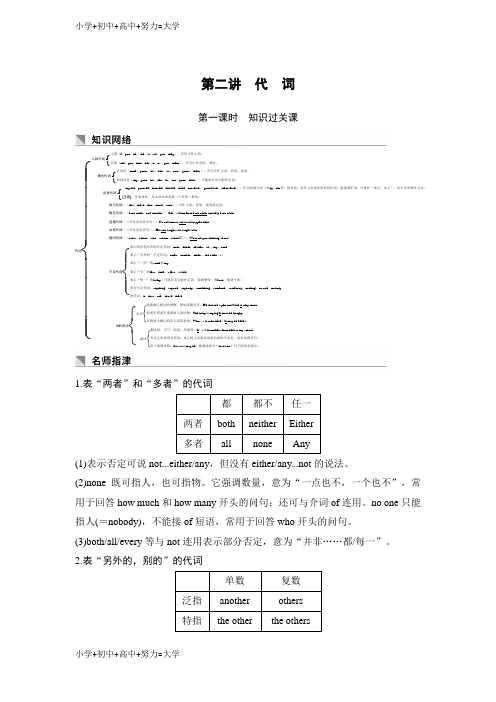
第二讲 代 词第一课时 知识过关课代词⎩⎪⎪⎪⎪⎨⎪⎪⎪⎪⎧人称代词{主格(I ,you ,he ,she ,it ;we ,you ,they ):在句中作主语。
宾格(me ,you ,him ,her ,it ;us ,you ,them ):在句中作宾语、表语。
物主代词{名词性(mine ,yours ,his ,hers ,its ;ours ,yours ,theirs ):在句中作主语、宾语、表语。
形容词性(my ,your ,his ,her ,its ;our ,your ,their ):只能放在名词前作定语。
反身代词{(myself ,yourself ,himself ,herself ,itself ;ourselves ,yourselves ,themselves ):作动词或介词(如by ,for 等)的宾语,或作主语或宾语的同位语,起强调作用,可译作“亲自,本人”,但不可单独作主语。
[注意] 作宾语时,与主语必须是同一人或同一事物。
指示代词:(this ,these ,that ,those ,such ):可作主语、宾语、表语或定语。
相互代词:(each other ,one another ):Let ’s learn from each other and help each other.连接代词:(详见名词性从句):No one knows what will happen next.关系代词:(详见定语从句):He who laughs last laughs best.疑问代词:(what ,which ,who ,whom ,whose 等):What are you thinking about ?不定代词⎩⎪⎨⎪⎧表示两者和多者的不定代词:both ,either ,neither ;all ,any ,none 表示“另外的”不定代词:other ,another ,others ,the other (s )表示“一些”的some 和any 表示“少”的few ,little ,a few ,a little 表示“每一”的every (只能在名词前作定语,强调整体)和each (强调个体)复合不定代词:anything ,anyone ,anybody ;something ,someone ,somebody ;nothing ,no one ,nobody 替代词:it ,that ,one ,those ,these it 的用法⎩⎨⎧实词⎩⎨⎧指前面已提过的事物、想法或情况等:He sent me a pen and I like it very much.性别不明或不重要的人或动物:The baby is crying.It must be hungry.在情境中确认的某人或某事物:Who ’s it over there ?It may be Mr.Li.虚词⎩⎨⎧指时间、天气、距离、环境等:It ’s 5 kilometers from here to my school.形式主语或形式宾语:真正的主语或宾语是后面的不定式、动名词或从句。
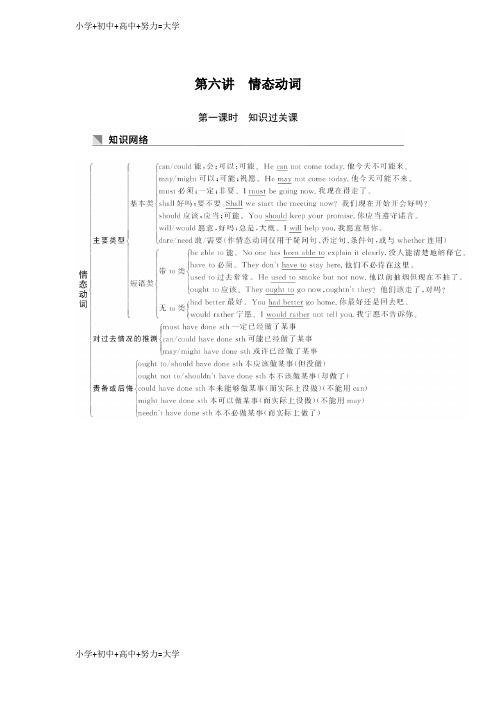
第六讲情态动词第一课时知识过关课读语篇,悟语法。
反复朗读下列短文,领悟画线黑体部分。
思考:各个情态动词的含义;什么情况下用情态动词的完成式,分别表达什么含义。
Lucy is an outgoing lady. She can[1]play many kinds of musical instruments. Actually, she could[2]play the piano when she was 8 years old. Lucy also keeps taking exercise every day. She says that she has__to[3]do some sports because she must[4] keep slim.“You shall[5] get fat soon if you don’t take exercise every day. ”she usually says to her friends.As for her, an elegant lady should[6]try to keep fit. However, last week, she found that she might[7] put on weight and she was worried and decided to lose weight. And these days she is always thinking that she may[8] succeed soon if she tries all her best. However, she is always lack of time because she ought__to[9] take care of her children.One night after supper, she walked quickly in order to go dancing at the Tomorrow Park and she was late. On her way, she thought that the dancing must__have__begun[10], and the coach could__have__taught__or__shown[11] many new moves. She was afraid that her friends might__have__left[12]before she got there. She was regretful then. She should__have__had[13]supper earlier, or she could__have__taken__a__taxi[14], and indeed she needn’t__have__taken[15]a bath in advance.When she reached the park finally, she found nobody was there. She remembered suddenly that it had been reported on the radio that there would be a heavy rain that night.1.can在此表示能力。
第四讲 定语从句第一课时 知识过关课定语从句⎩⎪⎪⎨⎪⎪⎧先行词:就是定语从句所修饰的词。
关系副词(状语)⎩⎪⎨⎪⎧when :I ’ll never forget the day when we met for the first time W.where :This is the factory where his father works W.why :The reason why he was late is that he got up late.关系代词(主宾表定)⎩⎨⎧who 主/宾:The teacher who teaches us English is from England.whom 宾:The person whom you talked with just now is our maths teacher.whose 定:I have a friend whose father works in Britain W.which 主/宾/定:Tom was late ,which made Mr.Smith angry W.that 主/宾/表:This is the best film that I have ever seen W.限制性定语从句:修饰或限制先行词,与先行词关系密切,之间无逗号;若去掉定语从句,意思不明确。
非限制性定语从句:只是对先行词进行补充说明,与先行词之间通常有逗号;若去掉从句,意思依然完整。
1.在限制性定语从句中which ,who ,whom 常可用that 代替。
关系代词作宾语时常被省略。
2.在非限制性定语从句中,或者当先行词是指人的those ,anyone ,everyone ,people ,he ,all ,few ,one(s)等时,不能用that 引导。
3.以下情况下一般用that :(1)当先行词是指物的all ,little ,few ,much ,any ,anything ,everything ,nothing ,none ,the one 时,或先行词被all ,little ,few ,much ,any ,every ,no 等修饰时。
第五讲 形容词和副词第一课时 知识过关课形容词和副词⎩⎪⎪⎪⎪⎪⎪⎨⎪⎪⎪⎪⎪⎪⎧形容词⎩⎪⎨⎪⎧基本用法⎩⎨⎧作定语:These are valuable suggestions.这些是宝贵的建议。
作表语:His suggestions are very valuable W.他的建议很有价值。
作补语:I consider his suggestion very valuable W.我认为他的建议很有价值。
后置定语⎩⎨⎧形容词短语:This is a film unsuitable for children W.这是一部儿童不宜的电影。
表语形容词:She is the only person aware of the danger W.她是唯一意识到这个危险的人。
修饰复合不定代词:I have something interesting to tell you.我有有趣的事要告诉你。
分词形容词⎩⎨⎧-ed 形容词:(人)感到……的-ing 形容词:令人……的(事物)表示类别或整体:the old 老年人;the young 年轻人;the wounded 伤员副词⎩⎨⎧基本用法:作状语,修饰动词、形容词、另一个副词、整个句子。
在句中的位置:在行为动词前或后;在所修饰的形容词、副词、句子之前;enough 放在所修饰的形容词或副词 的后面;频度副词常放在be 动词、情态动词之后,行为动词之前。
搭配特别的形容词和副词:a heavy rain 大雨;rain heavily 下大雨;a sound sleep 酣睡比较等级⎩⎪⎪⎪⎨⎪⎪⎪⎧两者⎩⎨⎧相同:as +原级+as...:He gets up as early as I.他和我起得一样早。
不如:not as +原级+as...:He doesn ’t get up as early as I.他不如我起得早。
超越:比较级+than...:He gets up earlier than anyone else in his class.他比班里其他人都起得早。
第二讲 代 词第一课时 知识过关课代词⎩⎪⎪⎪⎪⎨⎪⎪⎪⎪⎧人称代词{主格(I ,you ,he ,she ,it ;we ,you ,they ):在句中作主语。
宾格(me ,you ,him ,her ,it ;us ,you ,them ):在句中作宾语、表语。
物主代词{名词性(mine ,yours ,his ,hers ,its ;ours ,yours ,theirs ):在句中作主语、宾语、表语。
形容词性(my ,your ,his ,her ,its ;our ,your ,their ):只能放在名词前作定语。
反身代词{(myself ,yourself ,himself ,herself ,itself ;ourselves ,yourselves ,themselves ):作动词或介词(如by ,for 等)的宾语,或作主语或宾语的同位语,起强调作用,可译作“亲自,本人”,但不可单独作主语。
[注意] 作宾语时,与主语必须是同一人或同一事物。
指示代词:(this ,these ,that ,those ,such ):可作主语、宾语、表语或定语。
相互代词:(each other ,one another ):Let ’s learn from each other and help each other.连接代词:(详见名词性从句):No one knows what will happen next.关系代词:(详见定语从句):He who laughs last laughs best.疑问代词:(what ,which ,who ,whom ,whose 等):What are you thinking about ?不定代词⎩⎪⎨⎪⎧表示两者和多者的不定代词:both ,either ,neither ;all ,any ,none 表示“另外的”不定代词:other ,another ,others ,the other (s )表示“一些”的some 和any 表示“少”的few ,little ,a few ,a little 表示“每一”的every (只能在名词前作定语,强调整体)和each (强调个体)复合不定代词:anything ,anyone ,anybody ;something ,someone ,somebody ;nothing ,no one ,nobody 替代词:it ,that ,one ,those ,these it 的用法⎩⎨⎧实词⎩⎨⎧指前面已提过的事物、想法或情况等:He sent me a pen and I like it very much.性别不明或不重要的人或动物:The baby is crying.It must be hungry.在情境中确认的某人或某事物:Who ’s it over there ?It may be Mr.Li.虚词⎩⎨⎧指时间、天气、距离、环境等:It ’s 5 kilometers from here to my school.形式主语或形式宾语:真正的主语或宾语是后面的不定式、动名词或从句。
第三讲 名词性从句第一课时 知识过关课名词性从句⎩⎪⎪⎨⎪⎪⎧三个要素⎩⎪⎨⎪⎧连接词⎩⎨⎧that :不作任何句子成分,只起连接作用,引导宾语从句时有时可省略。
whether/if :有“是否”之意,不作任何句子成分。
连接代词:who ,whom ,what ,which 等,各自有意义,在从句中作主语、宾语、表语、定语。
连接副词:how ,where ,when ,why 等,各自有意义,在从句中作状语。
语序:与陈述句语序相同,即主语+谓语。
时态一致:主句谓语是现在时,从句谓语可以是各种时态;但若主句为过去式,从句通常也用过去式。
四种类别⎩⎨⎧主语从句:What he said was right.他说的话是对的。
宾语从句:He said that he would go with me W.他说他要和我一起去。
表语从句:The reason for his absence is that he was ill W.他缺席是因为病了。
同位语从句(说明句中某个抽象名词的具体内容):Word came that he won W.传来了他获胜的消息。
1.主语从句作主语,主句谓语动词通常用单数;为使句子平衡,常用it 作形式主语。
2.表语从句还可以用as if ,as though 引导。
3.表示“是否”,引导宾语从句时可用if 或whether ,但在介词后或直接与or not 连用时,只能用whether 引导;引导表语从句、同位语从句或位于句首的主语从句时,只能用whether ,不用if 。
4.同位语从句一般放在fact ,news ,idea ,promise ,suggestion ,advice 等抽象名词之后,说明或解释这些抽象名词的具体内容。
多用that 引导,不能由which 引导。
5.当宾语从句又带有补语时,要用it 作形式宾语。
6.在表示“建议”“命令”“要求”,如advice ,suggestion ,proposal ,order ,demand ,request 等词后的名词性从句,其谓语通常用“(should +)动词原形”。
基础保分篇第一讲 名 词第一课时 知识过关课名词⎩⎪⎪⎪⎪⎪⎪⎨⎪⎪⎪⎪⎪⎪⎧分类⎩⎨⎧普通名词⎩⎨⎧可数名词{个体名词:fan ,coach ,player ,apple ,table ,child ,woman ,face 等集体名词:family ,people ,crowd ,police ,class ,group 等。
不可数名词{物质名词:milk ,tea ,coffee 等。
抽象名词:attention ,imagination ,pride ,fun 等。
一分为二辨别法:把该名词分成两份,如果还能用原来的名称,且具有原来的性质和功能,是不可 数名词,否则是可数名词。
单数→复数(数量>1)⎩⎪⎨⎪⎧一般情况,加-s :fans ,eyes ,parents ,cameras 等。
以-s ,-x ,-sh ,-ch 结尾的名词,加-es :buses ,boxes ,dishes ,coaches 等,除stomachs 。
以“辅音字母加y ”结尾的名词,y →ies :families ,babies 等。
以-f (e )结尾的部分名词,f (e )→ves :thieves ,lives ,wives ,shelves ,selves ,knives ,halves ,leaves ,wolves ; 其他名词,加-s :roofs ,gulfs ,safes (保险箱)等。
以-o 结尾的名词,通常加-s :photos ,radios 。
但有生命的heroes ,tomatoes ,potatoes 例外。
单复数同形:deer ,sheep ,fish ,aircraft ,means ,Japanese ,Chinese (中国人)等。
不规则变化:child →children ,man →men ,foot →feet ,goose →geese ,tooth →teeth ,ox →oxen ,mouse → mice ,bacterium →bacteria ,criterion →criteria ,phenomenon →phenomena 等。
所有格⎩⎨⎧’s {有生命的人或物:Teachers ’ Day ;Tom and John ’s friends 。
表示时间、距离、金额、重量、国家或城市等的名词:two years ’ time ,an hour ’s walk of 无生命的东西的所有格:the legs of the table 那张桌子的腿用法⎩⎨⎧作主语:His parents were born in China.作宾语:Jeremy had fun with his supporters W.(分别作动词had 和介词with 的宾语)作定语:He is a professional basketball player. ⎭⎬⎫作表语:He is monitor of our class.作同位语:Tom ,monitor of our class ,has a ready hand.作补语:We elected him monitor W.[注意] 表示独一无二的官衔的名词,在句中作这三种成分时,省略其前冠词。
可数与不可数名词比较⎩⎪⎨⎪⎧可数名词有复数形式,而不可数名词没有可数名词前可直接加a/an ,而不可数名词不能可数名词前可直接用数词表示数量,而不可数名词需借助a piece of 之类的结构前面的修饰语也有所不同1.不可数名词与可数名词的转化(1)表示种类时:various fruits(各种水果)。
(2)表示“一场/段/件……”时:a timely rain(一场及时雨)。
(3)表示“一杯/罐/瓶”的tea ,coffee ,beer 等:two beers(两杯啤酒)。
(4)表示不同意思时:room房间(可数);余地,空间(不可数)。
[注意]有些不可数名词无论什么情况下也没有复数形式,即使受形容词修饰也不能加不定冠词,可称作“绝对不可数名词”。
例如:fun,housework,homework,advice,information,news,progress,equipment,furniture,baggage/luggage,jewellery,machinery等。
2.抽象名词具体化表示某种特性、状态、情感、情绪的抽象名词,可以具体化为可数名词,表示这样的“人或物”。
常见的有:3.具体名词抽象化具体名词可以部分丧失其一般意义,具有抽象名词的特征,因此无单复数形式。
(1)by后跟表示交通工具一类的名词,名词抽象化表概念,名词前无限定词,也不用复数;否则要用相应的介词。
如:by bus/car/train/bike=on a bus/in a car/on the train等。
(2)在go to school/church/hospital和at school, in prison等短语中,名词抽象化表示概念。
4.of+use/value/help/difference/importance/benefit等某些抽象名词,其含义相当于对应的形容词useful,valuable,helpful,different,important,beneficial在句中可作定语、表语、补语等。
The book is of great use.(=The book is very useful.)这本书很有用。
(表语)This is a book of great use.这是一本非常有用的书。
(定语)I find the book of great use.我觉得这本书非常有用。
(宾补)5.名词前的修饰语。
(1)several,(a) few,many,many a,a great/good many,a large number of,scores of,dozens of等只能修饰可数名词;除many a后接单数可数名词外,其余要接复数名词。
(2)a bit of,(a) little(少),much,a great deal of,a large amount of等只能修饰不可数名词。
(3)some,any,plenty of,a lot of,lots of,a large quantity of,quantities of,masses of等既可修饰可数名词的复数,也可修饰不可数名词。
读语篇,悟语法。
反复朗读下列短文,领悟画线黑体之名词的类别。
Born on August 23, 1988 in America[1], Jeremy Shu-How Lin[2] is a professional basketball[3]player[4]with the Huston Rockets of[5]the National Basketball Association[6] (NBA).But, to some degree, many Chinese fans[7] and coaches[8] take him as a Chinese guy or at least are willing to imagine him as a Chinese[9]just because he has a typical Chinese face and his parents[10] were born in China.Jeremy Lin has recently become a success[11]and attracted the world’s[12]attention, which gives Chinese people[13]a lot of imagination[14]and pride.As we know, in most people’s eyes[15], Jeremy is a miracle[16].In June, 2012, when Jeremy took his third trip[17]to China, a large crowd came to meet him,among whom there were various fans including some families[18],some children[19]and even some women players[20].They brought cameras[21]to take photos[22] with their idol.Jeremy had fun[23] with his supporters and expected to come back again.1.专有名词表示地点,第一个字母要大写。
2.专有名词表示人名。
3.名词作定语,修饰另一名词。
又如a book store。
4.表示职业或职位的单数可数名词player作表语,前面用不定冠词,表示“一个”。
5.因the Huston Rockets和the National Basketball Association都是由普通名词构成的专有名词;of the National Basketball Association是名词所有格,因无生命的东西的名词所有格一般用“of+名词”表示,又如:the cover of the book(书的封面)。
6.专有名词表示事物,这里指美国职业篮球联盟,常缩写为NBA。
7.fans为fan的复数形式,可数名词的复数形式一般在后面直接加-s。
8.coaches为coach的复数形式,以-s,-x,-sh,-ch结尾的可数名词,复数形式加-es。
又如boxes,dishes,buses等。
9.句中a Chinese是名词作补语。
Chinese指中国人,这里为单数;但它的复数与单数同形,类似的单词有deer,sheep,fish,aircraft,means,works,Japanese 等。
10.“形容词性物主代词+名词”表示“某人的……”。
11.这里的a success为抽象名词具体化,指“一个成功人士”。
12.有生命的人或物的所有格,一般用“名词+s”表示。
又如the teacher’s name。
13.people为集体名词,表示复数意义。
又如police,class,group等。
14.不可数名词imagination作宾语,在a lot of,some,any等限定词后面通常接名词。
15.名词eyes作介词in的宾语。
16.在冠词(a,an,the)后通常应有名词。